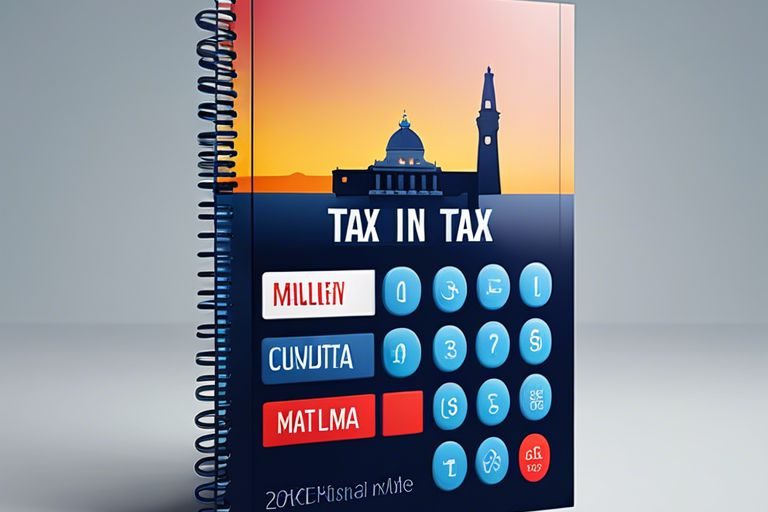Simplifying Tax in Malta – A Guide

#Guide- Navigating the tax system in Malta can be a daunting task for individuals and businesses alike. Understanding the ins and outs of taxation laws and procedures is crucial to ensure compliance and avoid any penalties. This comprehensive guide aims to simplify the complex tax regulations in Malta, highlighting important areas such as personal income tax rates, beneficial tax incentives for expatriates, and dangerous pitfalls to avoid. By providing a clear and concise overview of the Maltese tax system, readers will be equipped with the necessary knowledge to manage their taxes efficiently and effectively.
Types of Taxes in Malta
Your journey into understanding tax in Malta begins with familiarizing yourself with the various types of taxes that exist in the country. It is important to have a clear grasp of these different taxes to ensure compliance and avoid any potential issues. Knowing the types of taxes in Malta will empower you to navigate the tax landscape with confidence.
| Personal Income Tax | Corporate Tax |
| Value-Added Tax (VAT) | Property Tax |
| Social Security Contributions |
Personal Income Tax
To understand personal income tax in Malta, individuals need to be aware of the tax rates and thresholds that apply to their income. To ensure compliance with the law, it is important to keep accurate records of income and deductions to calculate the correct amount of tax payable.
Corporate Tax
Types of businesses operating in Malta are subject to corporate tax on their profits. Understanding the tax rates and regulations is necessary for businesses to fulfill their tax obligations. Another aspect to consider is tax planning strategies that can help optimize tax efficiency and minimize liabilities.
Value-Added Tax (VAT)
Taxes on goods and services in Malta are subject to Value-Added Tax (VAT). With a standard rate of 18%, VAT is an important source of revenue for the government. Businesses need to register for VAT if their turnover exceeds a certain threshold and comply with VAT regulations to avoid penalties.
Property Tax
One of the lesser-known taxes in Malta is property tax, which is imposed on owners of real estate. ValueAdded understanding of property tax rates and exemptions can help property owners manage their tax liability effectively.
Social Security Contributions
Malta requires individuals and employers to make social security contributions to fund social welfare programs. A strong understanding of the contribution rates and obligations is crucial for individuals and businesses to meet their social security responsibilities.
Step-by-Step Tax Filing Procedure
Keep Registration for Tax Identification
There’s a mandatory requirement for individuals in Malta to obtain a tax identification number (TIN) before submitting their tax returns. This can be done by completing the relevant form and submitting it to the Inland Revenue Department along with necessary identification documents.
Little Document Preparation and Records Keeping
It is imperative to keep all relevant documentation (6 posts)" class="autobesttag" style="color:#77da55" rel="nofollow" href="https://malta-media.com/tag/documentation/">documentation and records organized when filing your tax returns. This includes income statements, receipts, expenses, and any other supporting documents. Good record-keeping will not only make the filing process smoother but also help in case of any audits or inquiries.
Records Online and Offline Filing Processes
It is important to note that both online and offline filing processes are available in Malta. Taxpayers can choose the method that best suits their needs, whether it be through the e-services platform provided by the Inland Revenue Department or by submitting physical forms in person.
Procedure Payment Methods and Deadlines
StepbyStep, taxpayers are required to settle their tax liabilities by the set deadlines to avoid any penalties or fines. Different payment methods are available, including bank transfers, online payments, and payments at designated offices.
Registration
It is crucial for taxpayers to ensure they have a valid TIN and keep accurate records of their financial transactions for tax purposes. Failure to meet deadlines or provide complete and correct information can result in financial penalties or legal consequences. By following the step-by-step tax filing procedure in Malta, taxpayers can ensure compliance with tax regulations and avoid any issues with the authorities.
Factors to Consider When Simplifying Taxes
For individuals or businesses looking to simplify their taxes in Malta, there are several key factors to consider. By understanding these factors, you can streamline your tax processes and ensure compliance with Maltese tax laws. Any decision made regarding tax simplification should take these factors into account in order to achieve efficiency and effectiveness.
Assessing Residency Status
When determining your tax obligations in Malta, it is crucial to assess your residency status. Residency status can have a significant impact on the taxes you are required to pay, as residents and non-residents are subject to different tax rules. Any mistakes in determining your residency status can lead to penalties or fines, so it is important to seek professional advice if you are unsure.
Tax Benefits and Incentives
One of the key advantages of simplifying your taxes in Malta is the access to various tax benefits and incentives offered by the Maltese government. These incentives are designed to promote investment, innovation, and economic growth, making Malta an attractive location for businesses and individuals looking to optimize their tax liabilities.
Understanding Double Taxation Agreements
Double Taxation Agreements
An crucial consideration when simplifying taxes in Malta is the existence of Double Taxation Agreements (DTAs) with other countries. DTAs are designed to prevent individuals and businesses from being taxed twice on the same income, ensuring fair treatment and avoiding double taxation. Assessing the relevant DTAs can help you minimize tax liabilities and optimize your tax planning strategies.
Avoiding Common Pitfalls
Double Taxation
With the complexity of international tax laws, it is crucial to avoid common pitfalls that may result in double taxation or other issues. By staying informed and seeking professional advice, you can navigate potential pitfalls and ensure compliance with Maltese tax regulations. Being proactive and vigilant can safeguard your financial interests and prevent costly mistakes.
Tax Simplification Tips
Many taxpayers find the process of navigating through tax laws and regulations in Malta daunting. To ease this burden, here are some tips to simplify your tax obligations:
- Leverage Tax Credits and Deductions
- Seek Professional Advice
- Stay Updated with Tax Law Changes
Though taxlaws can be complex, understanding your eligibility for tax credits and deductions can significantly reduce your tax burden. If you have made charitable donations or investments in specific industries, make sure to claim all applicable taxbenefits when filing your taxes.
Seeking Professional Advice
Advice from a qualified tax professional can provide valuable insights into optimizing your tax situation. The complex nature of tax laws and regulations in Malta can make it challenging for individuals to navigate on their own. Consulting with a tax expert can help you identify opportunities for savings and ensure compliance with all relevant regulations.
Staying Updated with Tax Law Changes
Any changes in tax legislation can have a significant impact on your financial situation. It is crucial to stay updated with the latest developments in taxlaws to avoid any penalties or missed opportunities. Consider subscribing to newsletters or attending tax seminars to stay informed.
Updated knowledge of taxlaws can empower you to make informed decisions and ensure you are taking full advantage of all available tax benefits.
Pros and Cons of the Maltese Tax System
All pros and cons information should be broken down into
with two columns and up to 10 rows, title in tags,.Advantages for Individuals and BusinessesClearly, the Maltese tax system offers several advantages for both individuals and businesses. Some of the key benefits include a competitive corporate tax rate of 35%, extensive double taxation agreements with over 70 countries, no wealth tax, and various tax incentives for specific industries such as gaming and maritime services. Additionally, Malta’s tax system provides opportunities for tax refunds on dividends received from foreign entities, making it an attractive location for international businesses.Challenges and DrawbacksSystem challenges and drawbacks do exist within the Maltese tax system. While the tax rates are relatively low, enforcement and compliance issues have been a concern. There have been cases of tax avoidance and profit shifting by multinational corporations operating in Malta, raising questions about the effectiveness of the tax system in preventing such practices. Additionally, the complexity of the tax laws and regulations can be overwhelming for individuals and businesses, leading to potential errors in tax reporting.Challenges in the Maltese tax system also include the potential for tax evasion and money laundering activities due to the country’s attractiveness as a tax haven. The lack of transparency in certain tax practices and legal loopholes can make it difficult for authorities to track and enforce compliance, posing risks to the overall integrity of the tax system.ConclusionConclusively, navigating the tax system in Malta can be complex, but with the right knowledge and guidance, it can be simplified. Understanding the various tax types, rates, and regulations is vital for individuals and businesses operating in Malta. By following this comprehensive guide, taxpayers can streamline their tax obligations and ensure compliance with Maltese tax laws. Seeking professional advice and assistance can also be beneficial in optimizing tax planning strategies and minimizing tax liabilities. Ultimately, simplifying tax in Malta requires a proactive and informed approach, which can lead to financial efficiency and peace of mind for taxpayers.
FAQs:
What types of taxes are applicable in Malta?
Personal Income Tax, Corporate Tax, Value-Added Tax (VAT), Property Tax, Social Security Contributions.
What are the key considerations for personal income tax in Malta?
Understanding tax rates, thresholds, and keeping accurate records of income and deductions are crucial.
How can businesses optimize their tax efficiency regarding corporate tax in Malta?
Businesses should comprehend tax rates, regulations, and employ tax planning strategies effectively.
What are the requirements for Value-Added Tax (VAT) registration in Malta?
Businesses need to register for VAT if their turnover exceeds a certain threshold and comply with VAT regulations to avoid penalties.
What is the significance of Double Taxation Agreements (DTAs) in Malta?
DTAs prevent individuals and businesses from being taxed twice on the same income, aiding in minimizing tax liabilities and optimizing tax planning strategies.
Michael
With over 20 years experience in web design, SEO and website promotion I always give you an expert advice in regard to any issues related to your Site Design, SEO, Internet Marketing, Promotion, Backlinks, Site Content. In order to help you find out what is missing or can be improved and get higher rankings in Google and more traffic.
Recommended Posts

Financial Aspects of Doing Business in Malta
July 26, 2024

The Rise of Digital Banking Solutions in Malta
July 24, 2024





